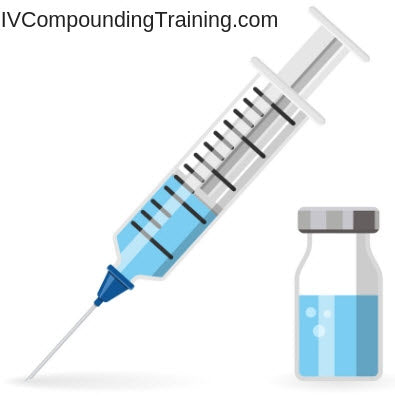How Do I Get Sterile Compounding Certification?
Sterile compounding certification is also known as sterile products certification or IV compounding certification and is an advanced certification for those who wish to transition into a sterile compounding pharmacy setting such as a hospital, home infusion, 503B FDA regulated outsourcing facilities that compound sterile medications, or facilities that offer sterility testing services and others.
Sterile compounding plays a crucial role in the healthcare industry, ensuring the safe and accurate preparation of medications for patients requiring sterile formulations.
Professionals involved in sterile compounding, such as pharmacy technicians and pharmacists, often seek specialized certification to demonstrate their expertise and commitment to patient safety. In this article, we will provide a step-by-step guide on how to obtain sterile compounding certification.
5 Steps To Certification
Step 1: Understand the Requirements:
Before pursuing sterile compounding certification, it is important to familiarize yourself with the requirements set forth by relevant certification bodies. The two most recognized certifications in the field are the Pharmacy Technician Certification Board's (PTCB) Compounded Sterile Preparation Technician (CSPT) certification and the Accreditation Council for Pharmacy Education's (ACPE) Sterile Compounding Certificate Program. The ACPE program for pharmacists and pharmacy techs is generally preferred. Both programs are offered on this website.
NEW - We now also offer a standalone Sterile Compounding and IV Preparation PTCB-recognized|CSPT eligible training program for Pharmacy Technicians.
Step 2: Education and Training:
To qualify for sterile compounding certification, you must complete the necessary education and training programs. Many certification programs require candidates to have a high school diploma or equivalent. Additionally, completion of a formal sterile compounding training program is often necessary. Ensure that the program you choose covers essential topics such as aseptic techniques, compounding calculations, proper handling of sterile equipment, and quality assurance measures.
Step 3: Hands-on Experience:
Building practical experience in sterile compounding is a crucial step toward certification. Many certification programs require a specific number of hours of hands-on experience. This experience will provide valuable exposure to aseptic techniques, cleanroom protocols, and the handling of sterile equipment.
Step 4: Study and Preparation:
Preparing for the sterile compounding certification examination requires focused study and review. Utilize study resources provided by certification bodies, including textbooks, study guides, and online resources.
These materials cover the necessary knowledge and skills required for sterile compounding. Review topics such as sterility principles, USP compounding guidelines, contamination prevention, and quality control measures. Practice compounding calculations and familiarize yourself with the various types of sterile preparations.
Step 5: Continuing Education:
Once you have achieved sterile compounding certification, it is crucial to stay updated on best practices and advancements in the field. Certification bodies often require certificate holders to complete continuing education credits to maintain their certification.
Stay informed about industry updates, attend conferences, workshops, and webinars, and take advantage of educational opportunities to enhance your knowledge and skills in sterile compounding.
Obtaining sterile compounding certification demonstrates your commitment to patient safety and excellence in the field of compounding. By following this step-by-step guide, you can embark on a fulfilling journey towards becoming a certified sterile compounding professional.
Remember to research certification requirements, complete the necessary education and training, gain hands-on experience, study diligently, register for and successfully complete the examination, and continue your professional development through ongoing education.
With dedication and a focus on continuous learning, you can enhance your career prospects and make a significant impact on the quality of sterile compounding practices.
A Few Benefits Of Getting Your Sterile Compounding Certification
- Escape your dead-end, monotonous, always understaffed, unfulfilling job.
- Gain greater recognition for your effort and academic achievement by becoming IV certified.
- Get potentially higher pay.
- Open doors to new opportunities in the field of sterile compounding in pharmacy and beyond.
- Gain new skills that can help advance your career further.
- Easier to climb up the career ladder when you’re certified in sterile products, sterile compounding, or IV compounding.
- Transition into a more fulfilling career within Pharmacy with options to explore other careers outside pharmacy in drug manufacturing, sterility testing, sterile compounding equipment certification, and more.
Is Sterile Compounding Certification Really Necessary?
Yes. Some facilities, such as hospitals, require IV certification even if you have experience and have worked in sterile compounding settings for years. The trend is shifting, and most managers and recruiters want to see IV certification on your resume.
Due to budget constraints and understaffing, most facilities don’t have the time to train new employees from scratch. A training program specific to the procedures and processes for that facility will still exist.
However, don’t expect employers to train you on the basics that you should already know before applying for a particular sterile compounding job. Becoming IV certified is HIGHLY recommended if you want to stand a chance at being selected for the position.
On the other hand, there are some employers that have an established training program, BUT still require the applicant to have the necessary didactic knowledge and official IV certification. As far as the practical training is concerned, that may take place on the job if the facility has adequate staffing and can dedicate a trainer.
If you’re IV certified, your resume will receive a closer look. Any way you look at it, IV Certification is necessary and recommended, and separates you from other applicants who didn’t want to invest in their future.
The certification program awards 20 CE credits to pharmacists and 40 CE credits to pharmacy technicians and the Sterile Compounding and IV Preparation PTCB-recognized|CSPT eligible program grants 40 CE credits as well.
